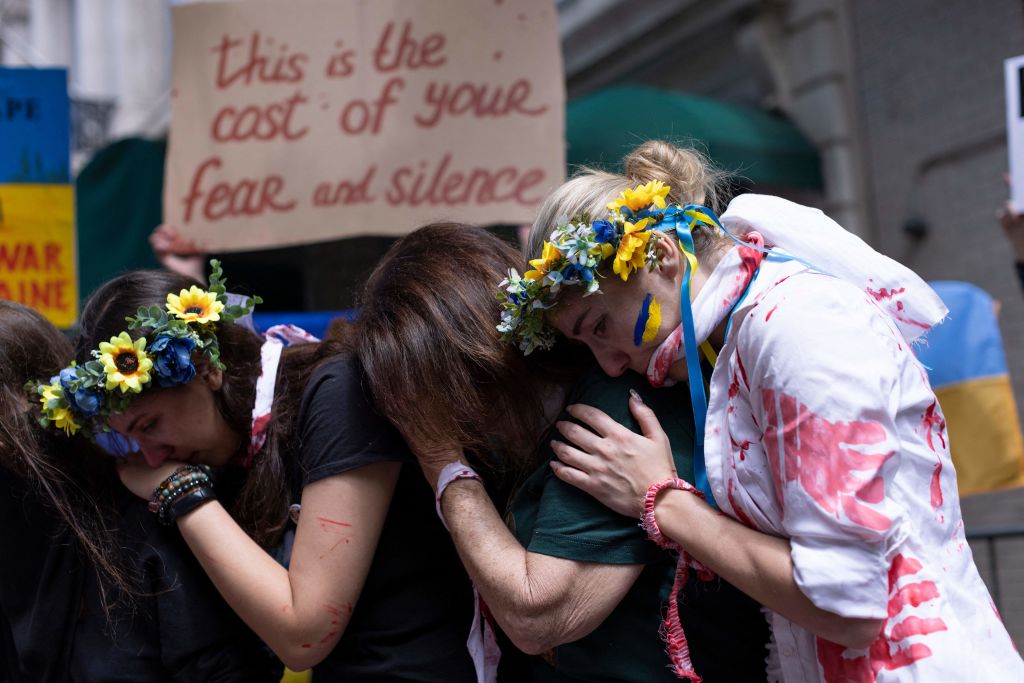
From Ukraine to Israel, Iran to Afghanistan, and a number of other less covered war-torn areas, atrocities against children, women and other innocents today are on the rise, and when perpetrators get away with it, these crimes envelop all of humanity.
The weaponization of rape and abduction during periods of conflict goes back to the very beginnings of warfare. Flemish Realist Peter Paul Ruben’s monumental painting “The Rape of the Sabine Women” depicts Roman soldiers projecting dominance and terror over half-naked women some 2,500 years ago. But you’d think the world would learn, move forward, and become more humane.
Today, the sexual violence perpetrated against women by Hamas terrorists or Russian soldiers, and the brutal abductions of innocents, some of whom had to watch parents and family members murdered before their eyes, be it in Ukraine or Israel or anywhere else in the world, needs to be condemned in the strongest of terms. The perpetrators of these crimes must be put to justice. And it is beyond urgent that all hostages be freed forthwith.
Sheryl Sandberg — founder of the nonprofit organization LeanIn.Org and the former Chief Operating Officer at Meta – is one of the high profile leaders amplifying the importance of speaking up in the face of atrocities against women, including on October 7. More like Sheryl need to stand up and speak up.
There are more than 110 lethal conflicts happening right now, according to the Geneva Academy of International Humanitarian Law and Human Rights in Switzerland. And all too often it is the women and the most vulnerable who bear the most severe repercussions.
The common thread that I hear from many who work on this issue can be summed up as despair – but despair tinged with hope. The despair comes because despite efforts following World War II to put in place a rules-based regime, including a Universal Declaration of Human Rights (adopted 75 years ago this past month), those rights in 2024 continue to be violated with little accountability or consequence.
But the hope comes from the fact that there are many individuals who genuinely seek a world where the rights of all, and especially women, are protected. They deserve to not only be listened to but heeded. We need to advocate in common cause against criminal abductions and violations of women, whether in Ukraine, Israel, Afghanistan, Iran or anywhere else in the world. United we are stronger.
There is hope to be found even in Vladimir Putin’s Russia. A low-key but effective anti-war protest – led by women relatives of soldiers – has sprung to life. Dubbed the “white scarves” movement, the women gather to lay carnations at unknown soldier’s monuments and have issued a manifesto calling Putin’s mobilization of their menfolk “legalized slavery.”
For hope to be realized, we need greater efforts to hold those to account who have committed abduction against the vulnerable and sexual violence against women as a weapon of war. Sanctions efforts are ongoing, including an announcement that the U.K., U.S. and Australia are sanctioning key figures in Hamas’s financial network. The International Criminal Court (ICC) charged Putin with the crime of unlawful deportation and transfer of children. The ICC can make a case against Hamas as well. We must protect women’s rights and the rights of the vulnerable. And we must exert all pressure possible, so that those abducted out of Ukraine, Israel, or anywhere in the world are returned urgently to their homes.
More Must-Reads From TIME
- The 100 Most Influential People of 2024
- Coco Gauff Is Playing for Herself Now
- Scenes From Pro-Palestinian Encampments Across U.S. Universities
- 6 Compliments That Land Every Time
- If You're Dating Right Now , You're Brave: Column
- The AI That Could Heal a Divided Internet
- Fallout Is a Brilliant Model for the Future of Video Game Adaptations
- Want Weekly Recs on What to Watch, Read, and More? Sign Up for Worth Your Time
Contact us at letters@time.com